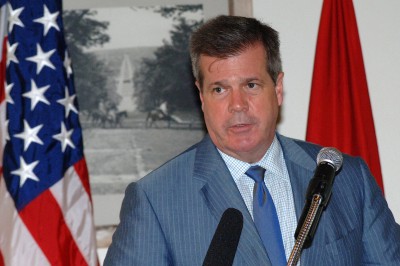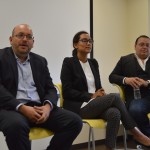
The Initiative on Cities is adding an advisory board of Boston University faculty members to its team this year in order to continue integrating BU with its urban community, a legacy of the program’s founding co-director, the late Boston Mayor Thomas Menino, the center announced Sept. 2.
IOC’s Executive Director Katharine Lusk said this year’s changes were made to embrace the program’s original mission and use the community at BU. The advisory board will be comprised of faculty members from 13 of the university’s different departments and schools.
“The advisory board is our way of formally engaging the breadth of talent and faculty members we work with at the university,” Lusk said. “They will help us be relevant and useful to connect BU to cities and urban populations, which is the program’s biggest goal.”
The advisory board will be tasked with selecting research grants and running a seminar series to bring a variety of experts to present for BU students and faculty, Lusk said.
Professor Jack Beermann from the School of Law is one of the 13 members of the faculty advisory board. He said he hopes his involvement can have a positive impact on not only the general student body but also the law school community.
“The idea is to bring reps from different university departments, schools and colleges that do research that’s relevant to the IOC,” he said. “At the law school, we have programs involving local government law, so that’s central to some of the work of the IOC.”
Karl Dean, mayor of Nashville, Tennessee, will serve as the IOC’s first Mayor in Residence, another change announced this summer. He will be on campus for the spring semester, teaching an undergraduate political science course titled “The American City.”
Dean will be a permanent on-campus resource for students and also be involved in advising the IOC on its Menino Survey of Mayors initiative, which continues Menino’s mission of giving a voice to the priorities and concerns of our nation’s urban leaders, Lusk said.
“We knew Mayor Menino was a valuable resource for everyone at the university, so we wanted someone physically here all the time,” Lusk said. “We have resources for students who often come just for a lecture, but we wanted someone to be a permanent resource available to faculty and students, and Mayor Dean is a great addition.”
Mayor Dean’s past as an attorney makes him a potential valuable resource to the law school, its students and faculty, Beermann said.
“We haven’t made official plans yet, but we hope he can reach out to our students, especially those interested in local government law,” Beermann said. “He could be a great resource for our students to give them an idea what areas of practice are available for after they leave us.”
Mike Carrigan, a sophomore in the College of Arts and Sciences, said he sees the impact the city of Boston has on academic and social opportunities for students.
“When the city is integrated into my classes, I get to see a broader range of cultures that tie into what I’m learning about and I get perspective I wouldn’t be able to otherwise find,” he said. “Everyone could find something exciting, in business or sports or even something with city hall and the opportunity to get involved in politics.”
Christine Bowman, a graduate student in the College of Communication, said she values BU’s integration with Boston’s urban environment and the program’s emphasis on education about urban issues.
“It’s important to know about the city you live in,” she said. “Specifically, I think it helps to know about the resources available and how you can make an impact because we all want to be immersed in the city, that’s why we are here.”
Elizabeth Copeland, a junior in the Questrom School of Business, said she thinks BU could benefit from increased involvement with the surrounding city, and the new programs could bring resources students otherwise wouldn’t find.
“I don’t know if BU has any specific strong ties in the city, so it would be cool to see us become more integrated and play a bigger role in the community,” she said. “Especially because living in the city has so many opportunities, it would be great if there was a way for them to be more convenient for students and get everyone involved.”




